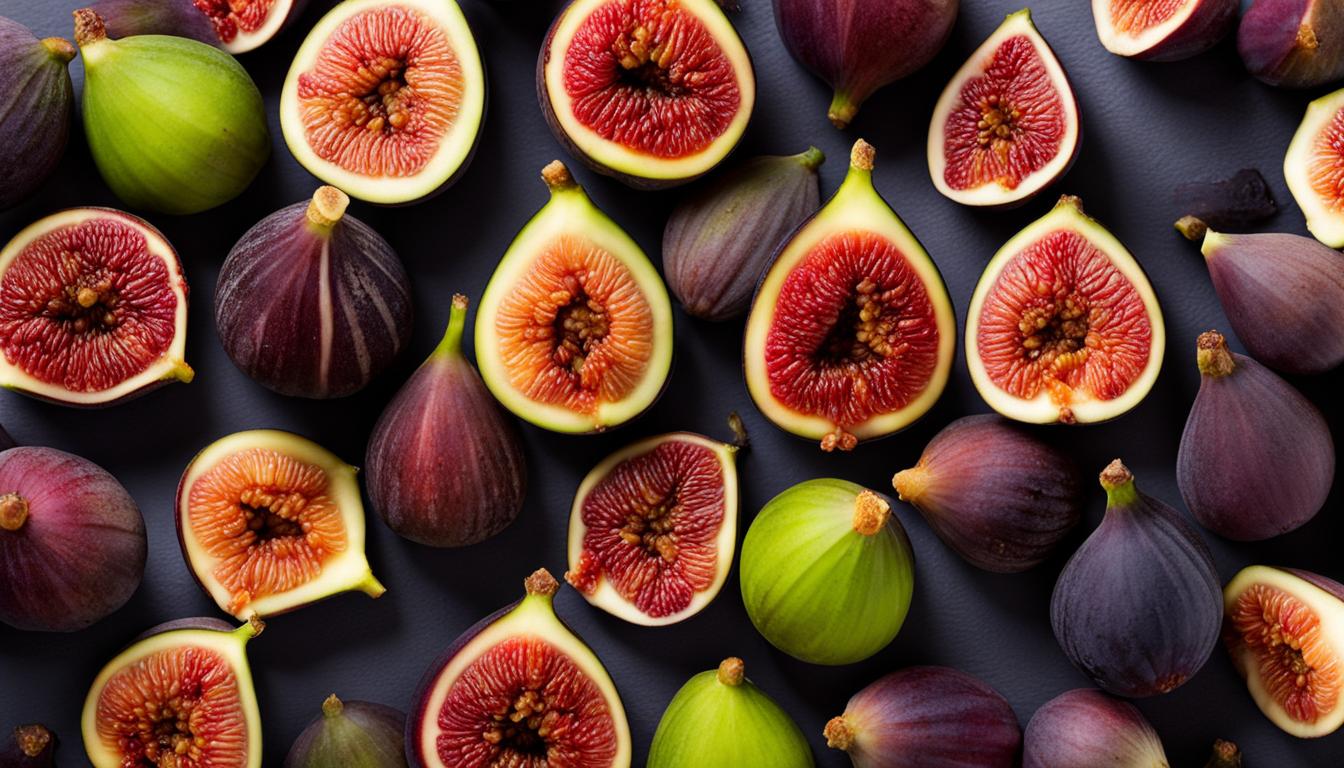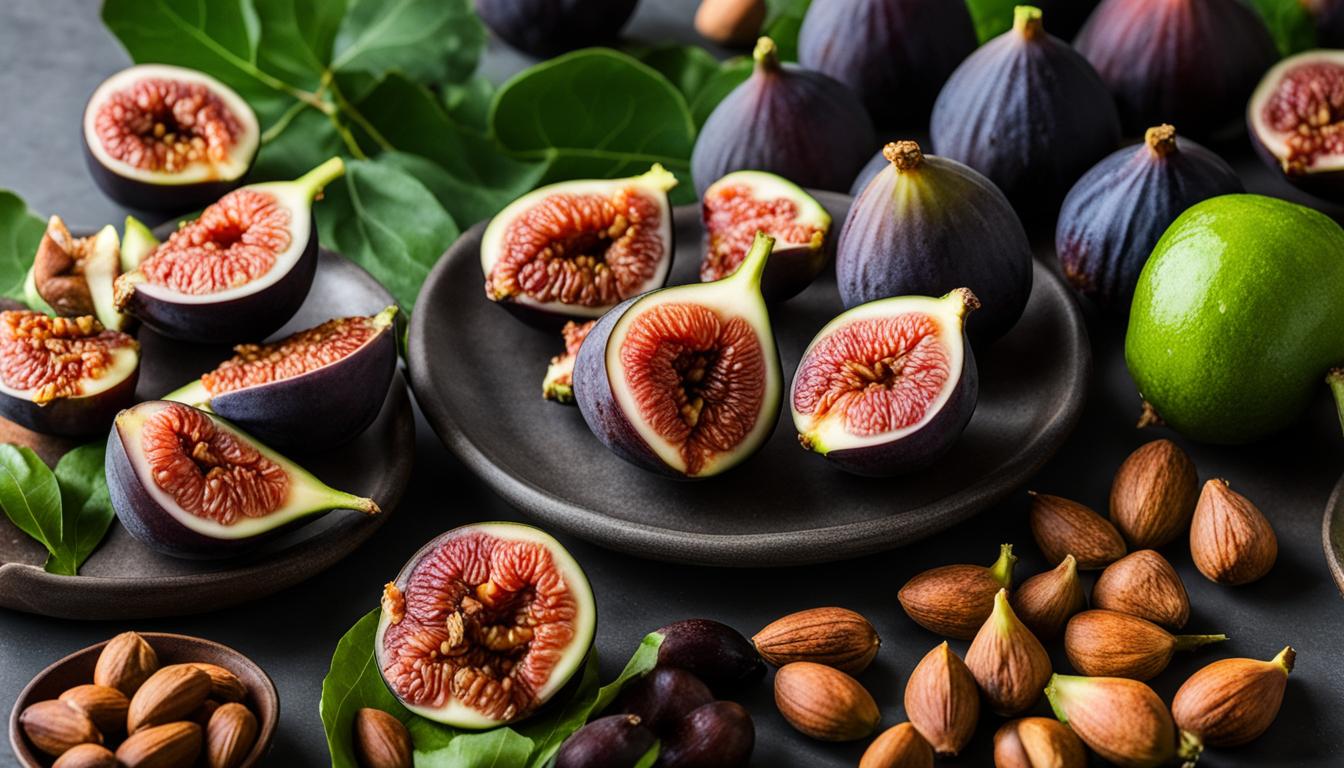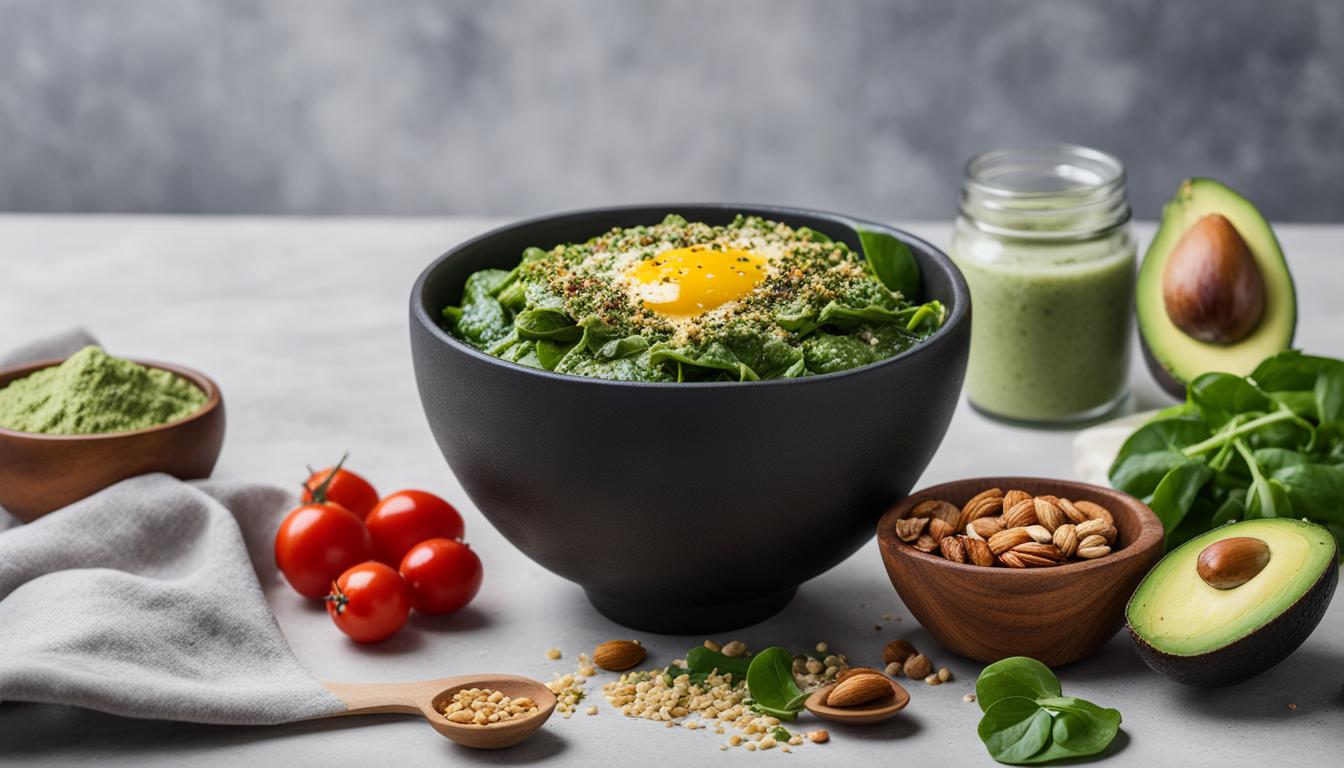If you’re following a keto diet, you may be wondering if figs can be incorporated into your low-carb meal plan. In this article, we’ll explore whether figs are keto-friendly and how they can impact your carbohydrate intake.
The ketogenic diet, commonly known as the keto diet, is a low-carb, high-fat diet that aims to promote weight loss and improve overall health. One of the key principles of the keto diet is restricting carbohydrate intake to achieve a state of ketosis, where your body burns fat for fuel instead of carbohydrates.
Figs, however, are not considered keto-friendly due to their high carbohydrate content. A 100g serving of figs contains approximately 16.28g of net carbs, which exceeds the typical daily allowance of 20g for a strict keto diet. Consuming figs may disrupt the state of ketosis and push your body out of this metabolic state.
Key Takeaways:
- Figs are not considered keto-friendly due to their high carbohydrate content.
- The ketogenic diet emphasizes low carb, moderate protein, and high-fat intake.
- A strict keto diet typically restricts daily carb intake to around 20g.
- Figs have a net carbohydrate content of 16.28g per 100g, which can quickly exceed the daily carb limit on a keto diet.
- While figs are not ideal for a strict keto diet, they offer various health benefits and can be enjoyed in moderation as part of a balanced diet.
Understanding the Keto Diet and Carbohydrate Intake
The ketogenic diet is a low-carb, moderate-protein, and high-fat eating plan that has gained popularity for its potential health benefits and weight loss effects. In order to achieve and maintain a state of ketosis, where the body uses ketones derived from fat for energy instead of glucose, it is essential to carefully monitor and control carbohydrate intake.
For those following a strict keto diet, the daily carb limit typically ranges around 20g or less. This strict restriction on carbohydrate intake forces the body to rely on stored fat for fuel, leading to weight loss and other metabolic benefits.
When determining your daily carb limit, it’s important to consider both the gross carb count and net carbs of the foods you consume. Net carbs are calculated by subtracting the dietary fiber from the total carbohydrate content. This is because fiber is not fully digested and does not significantly impact blood sugar levels.
By limiting carbohydrates and increasing fat consumption, the body undergoes metabolic adaptations that can promote weight loss and improve various health markers. However, it’s crucial to find the right balance and individualize your approach to the keto diet based on factors such as activity level, overall health, and personal goals.
Benefits of a Strict Keto Diet
A strict keto diet can offer several benefits, including:
- Promoting weight loss by shifting the body into a fat-burning mode
- Improving insulin sensitivity and blood sugar control
- Reducing inflammation in the body
- Increasing satiety and reducing hunger cravings
- Enhancing mental clarity and focus
Challenges of Strict Keto Diet
While the keto diet offers numerous benefits, it may present some challenges:
- Strict adherence to a low-carb diet, which can be difficult for those used to higher carbohydrate intake
- Initial adjustment period, commonly known as the “keto flu,” which may cause fatigue, headaches, and irritability
- Limited food choices, as many carb-rich foods are excluded from the diet
- Possible imbalances in nutrient intake if not carefully planned
- Social and practical challenges when dining out or attending gatherings
Incorporating regular physical activity, staying well-hydrated, and consulting with a healthcare professional or registered dietitian can help you overcome challenges and optimize your experience on the keto diet.
| Macronutrient | Recommended Percentage |
|---|---|
| Carbohydrates | 5-10% |
| Protein | 20-30% |
| Fat | 60-75% |
The table above provides a general breakdown of the recommended macronutrient percentage for a typical keto diet. However, it’s important to work with a healthcare professional or registered dietitian to determine the right macronutrient ratios and daily calorie intake that best suits your individual needs and goals.
The Carb Content of Figs
Figs are a delicious and nutrient-rich fruit that can be enjoyed in various ways. However, when it comes to following a keto diet, it’s essential to be mindful of the carb count and net carbs in figs. The carb count of figs can significantly impact your daily carbohydrate intake and the state of ketosis.
Per 100g of figs, the net carb content is approximately 16.28g. This means that consuming just one serving of figs can quickly exceed the daily carb limit on a keto diet, which usually ranges around 20g of net carbs for strict adherence.
To put it into perspective, here’s a breakdown of the typical carb count for various serving sizes of figs:
| Serving Size | Carb Content |
|---|---|
| 1 fig (50g) | 8.14g of net carbs |
| 1 cup (162g) | 26.35g of net carbs |
| 100g | 16.28g of net carbs |
As you can see, even a small serving of figs can contribute a significant number of grams of net carbs to your daily intake. Therefore, it is crucial to carefully track and calculate the carb content when incorporating figs into a low-carb or ketogenic meal plan.
Remember that individual carb tolerance may also vary, so it’s important to listen to your body and adjust your carb intake accordingly while maintaining ketosis.
https://www.youtube.com/watch?v=e3PWgMcoh7U
Impact of Figs on Ketosis
Consuming figs can potentially disrupt ketosis, the metabolic state in which the body burns fat for energy. The high carb content of figs may raise blood sugar levels and hinder the fat-burning process. This can be especially impactful for individuals following a strict keto diet.
To understand the impact of figs on ketosis, it’s important to consider the carbohydrate content of these fruits. Figs are relatively high in carbs, with a net carbohydrate content of 16.28g per 100g. This means that consuming figs can quickly exceed the daily carb limit typically followed by individuals on a strict keto diet.
The strict keto diet aims to keep carbohydrate intake low to promote ketosis and maximize fat burning. When you consume foods high in carbs, such as figs, your body may shift from using fat for fuel to using carbohydrates. This can slow down the fat-burning process and affect your weight loss goals.
Additionally, figs may cause a spike in blood sugar levels due to their carbohydrate content. This can impact blood sugar control, especially for individuals with diabetes or those trying to manage blood sugar levels through diet. Maintaining stable blood sugar levels is essential for overall health and well-being.
If you are following a strict keto diet and aiming to reach or maintain ketosis, it is advisable to limit or avoid fig consumption. Instead, focus on incorporating low-carb, keto-friendly fruits into your diet, such as berries, which have a lower carb count and are less likely to disrupt ketosis.
While figs may not align with a strict keto diet, they can still be enjoyed in moderation if you are following a less strict low carb or balanced diet. As with any dietary choices, it’s important to listen to your body and make informed decisions based on your individual goals and preferences.
Before making any significant changes to your diet, it’s always advisable to consult with a healthcare professional or a registered dietitian who can provide personalized guidance tailored to your specific needs and health conditions.
Nutritional Profile of Figs
Figs offer a variety of health benefits and are rich in essential nutrients. They are a good source of dietary fiber, which promotes digestion and provides a feeling of fullness. Figs also contain various vitamins, minerals, and antioxidants that support overall health.
Dietary fiber is an important component of a healthy diet, and figs are a great way to incorporate it. Fiber-rich foods like figs can help regulate bowel movements, prevent constipation, and improve overall digestive health. The fiber in figs also helps you feel full for longer, aiding in weight management and preventing overeating.
In addition to being high in fiber, figs are packed with essential nutrients. They are a good source of vitamins such as vitamin K, which plays a role in blood clotting, and vitamin B6, which supports brain function and helps the body produce red blood cells.
When it comes to minerals, figs are a standout. They contain significant amounts of potassium, a mineral that helps maintain healthy blood pressure levels and supports heart health. Figs also provide calcium, iron, magnesium, and manganese, which are important for bone health, energy production, and overall well-being.
Antioxidants are another valuable component of figs. These compounds help protect the body against oxidative stress and damage caused by harmful free radicals. The antioxidants in figs, such as phenols and flavonoids, contribute to their potential health benefits and may help reduce the risk of chronic diseases like heart disease and certain types of cancer.
Incorporating figs into your diet can be a delicious way to boost your intake of essential nutrients, promote digestive health, and enjoy the numerous health benefits they offer.

| Nutrient | Amount per 100g |
|---|---|
| Calories | 74 |
| Carbohydrates | 19g |
| Fiber | 2.9g |
| Sugar | 16g |
| Fat | 0.3g |
| Protein | 0.7g |
| Potassium | 232mg |
| Vitamin K | 4.7µg |
| Vitamin B6 | 0.1mg |
| Calcium | 35mg |
| Iron | 0.4mg |
| Magnesium | 17mg |
| Manganese | 0.1mg |
As seen in the table above, figs are relatively low in calories and fat, making them a healthy choice for those looking to maintain or lose weight. They also provide a good amount of potassium for electrolyte balance and heart health.
Keto-Friendly Fruit Alternatives
While figs may not be suitable for a keto diet, there are plenty of other low-carb fruits that can be enjoyed on a ketogenic meal plan. Incorporating the right fruits into your diet can provide essential nutrients while maintaining a low carb intake. Here are some keto-friendly fruit options to consider:
- 1. Berries: Berries such as raspberries and blackberries are excellent choices for a low-carb diet. They are packed with antioxidants, vitamins, and minerals while being relatively low in net carbs. For example:
- Raspberries: With just 5g of net carbs per 100g, raspberries are a great addition to keto-friendly dishes and snacks.
- Blackberries: Blackberries contain approximately 6g of net carbs per 100g and are a delicious option for satisfying your fruit cravings.
- 2. Avocado: Although technically a fruit, avocados have a low net carb content and are high in healthy fats. They are not only a great addition to keto meals but also provide numerous health benefits.
- 3. Coconut: Coconut in various forms, such as fresh, shredded, or in oil or milk form, can be enjoyed as a keto-friendly fruit option. It offers a unique flavor profile and contains beneficial medium-chain triglycerides (MCTs).
These low-carb fruits can be incorporated into various keto-friendly dishes and desserts. Feel free to experiment and explore new recipes to ensure a well-rounded and enjoyable eating experience while staying on track with your ketogenic diet.
Tips for Incorporating Figs into a Keto Diet
If you’re determined to include figs in your keto meal plan, it’s crucial to be mindful of your carb intake and maintain a proper balance in your diet. Here are some valuable tips to help you enjoy figs while staying in ketosis:
- Monitor your carb intake: Keep a close eye on your carbohydrate consumption and make sure it fits within your daily limit for a keto diet. One serving of figs can quickly add up to a significant amount of carbs, so consider portion control and moderation.
- Track your macros: Utilize tracking tools and apps to monitor your macronutrient intake, including carbs, fats, and proteins. This will help you make informed dietary choices and maintain an optimal balance for ketosis.
- Pair figs with high-fat foods: To offset the carb content of figs, incorporate them into meals or snacks that are rich in healthy fats. This can help slow down the digestion and absorption of carbs, minimizing their impact on blood sugar levels.
- Opt for other low-carb fruits: While figs may be challenging to fit into a keto meal plan, there are plenty of other low-carb fruit options available. Berries like raspberries and blackberries, for example, are excellent choices as they have a lower net carb count.
Remember, maintaining ketosis requires careful balance and monitoring in order to achieve and sustain the metabolic state. By being mindful of your carb intake and incorporating figs strategically, you can enjoy them while still maintaining ketosis and reaping the benefits of a keto diet.
Below is a table summarizing the carbohydrate content of figs and some keto-friendly fruit alternatives.
| Fruit | Net Carb Content (per 100g) |
|---|---|
| Figs | 16.28g |
| Raspberries | 5.44g |
| Blackberries | 4.88g |
The Health Benefits of Figs
While figs may not be ideal for a strict keto diet, they still offer several health benefits. Their inclusion in a balanced and varied diet can contribute to overall well-being. Let’s explore some of the key health benefits of figs.
1. Support a Healthy Digestive System
Figs are rich in dietary fiber, which plays a crucial role in maintaining a healthy digestive system. Fiber adds bulk to the stool, aiding in regular bowel movements and preventing constipation. It also promotes the growth of beneficial gut bacteria, ensuring optimal gut health.
2. Aid in Weight Loss
Fiber-rich foods like figs can help with weight loss efforts. The high fiber content in figs provides a feeling of fullness, reducing overall calorie intake. Additionally, fiber slows down the digestion process, preventing blood sugar spikes and cravings for unhealthy snacks.
3. Reduce the Risk of Heart Disease
Figs contain antioxidants, such as polyphenols, which help reduce oxidative stress and inflammation in the body. These antioxidants can help protect against heart disease by preventing the oxidation of cholesterol and reducing the formation of plaque in the arteries.
4. Provide Essential Nutrients
Figs are a good source of essential nutrients, including vitamins A, C, and K, as well as minerals like potassium and magnesium. These nutrients support various bodily functions, such as immune system function, bone health, and electrolyte balance.
By incorporating figs into a balanced diet, you can enjoy their health benefits while still maintaining a low-carb lifestyle. However, it’s important to remember that moderation is key, especially for those closely following a strict keto diet.
So, while figs may not be suitable for daily consumption on a keto diet, enjoying them occasionally can still provide valuable nutrients and contribute to a healthy lifestyle.
Remember, always consult with a healthcare professional or registered dietitian to get personalized advice, especially if you have specific health conditions or dietary restrictions.
Conclusion
In conclusion, while figs are not considered keto-friendly due to their high carbohydrate content, they can still be enjoyed in moderation as part of a balanced diet. It is important to be mindful of your carb intake and consider low-carb alternatives when following a strict keto diet. By focusing on healthy fats and incorporating other nutritious foods, you can support your keto journey and still benefit from the nutritional value of figs.

References
The information provided in this article is based on data and insights from reputable sources. The primary source for nutritional data on figs is the U.S. Department of Agriculture’s FoodData Central system, which provides accurate information about the composition and nutrient content of various foods. The research and information presented in this article have been curated from scientific studies, academic journals, and trusted health websites to offer a comprehensive understanding of the topic.
Sources
- Ingram, A. (2019). Nutritional Content and Health Benefits of Figs. Medical News Today. Retrieved from https://www.medicalnewstoday.com/articles/ nutrition-facts-and-health-benefits-of-figs
- United States Department of Agriculture. (2021). FoodData Central. Retrieved from https://fdc.nal.usda.gov/
- National Institute of Diabetes and Digestive and Kidney Diseases. (2020). Ketogenic Diet. Retrieved from https://www.niddk.nih.gov/health-information/weight- management/low-carbohydrate-diets/ketogenic-diet
- Bonfiglio, N. (2020). What Is Ketosis? An Overview of the Keto Diet. Healthline. Retrieved from https://www.healthline.com/nutrition/what-is-ketosis
These sources are reliable references that have been used to support the information presented in this article. Consultation with healthcare professionals and registered dietitians is recommended for personalized advice and guidance regarding dietary changes and their effects on health.
Keto-Friendly Alternatives to Figs
| Fruit | Net Carb Content (per 100g) |
|---|---|
| Raspberries | 5.44g |
| Blackberries | 9.61g |
| Strawberries | 5.54g |
| Avocado | 1.84g |
The table above showcases some keto-friendly alternatives to figs that have lower net carb content. These fruits can be enjoyed in moderation on a keto diet without significantly impacting ketosis. Incorporating these low-carb options can provide variety and nutrient benefits while adhering to the principles of a ketogenic meal plan.
Note: The image above showcases a visual representation of keto-friendly fruits. It serves as a visual guide for selecting low-carb options in a ketogenic diet.
Disclaimer
The information provided in this article is for informational purposes only and should not be considered as medical or dietary advice. While the keto diet has gained popularity for its potential benefits, it is important to consult with a healthcare professional or registered dietitian before making any changes to your diet.
Every individual is unique, and what works for one person may not work for another. Factors such as specific health conditions, dietary restrictions, and personal goals should be taken into consideration when embarking on any new dietary plan, including the keto diet.
It is recommended to seek professional guidance to ensure the keto diet is suitable for your individual needs and to receive personalized dietary advice tailored to your circumstances. Consulting with a healthcare professional will also help ensure that you are consuming an appropriate balance of nutrients and monitoring your health throughout the process.
FAQ
Are figs keto friendly?
No, figs are not considered keto-friendly due to their high carbohydrate content.
Can I eat fresh figs on a keto diet?
Fresh figs are relatively high in carbs and are not recommended for a strict keto diet.
How many net carbs are in fresh figs?
One small fresh fig has approximately 5.4 grams of net carbs.
How many carbs are in dried figs?
Dried figs are even higher in carbs, with approximately 20.6 grams of net carbs per fig.
Will eating figs kick me out of ketosis?
Consuming figs can potentially disrupt ketosis due to their high carbohydrate content.
What are some low-carb fruit options for a keto diet?
Berries, such as raspberries and blackberries, are excellent low-carb fruit choices for a keto diet.
Can I incorporate figs into a keto meal plan?
If you want to include figs in your keto diet, it is important to carefully monitor your carb intake and stay within your daily limit.
What are the health benefits of figs?
Figs are a good source of dietary fiber and contain various vitamins, minerals, and antioxidants that support overall health.
Can figs help with weight loss?
Figs are rich in fiber, which can support a healthy digestive system and aid in weight loss when consumed as part of a balanced diet.
Is it recommended to consult a healthcare professional before starting a keto diet?
Yes, it is always recommended to consult with a healthcare professional or registered dietitian before making any changes to your diet, especially if you have specific health conditions or dietary restrictions.


